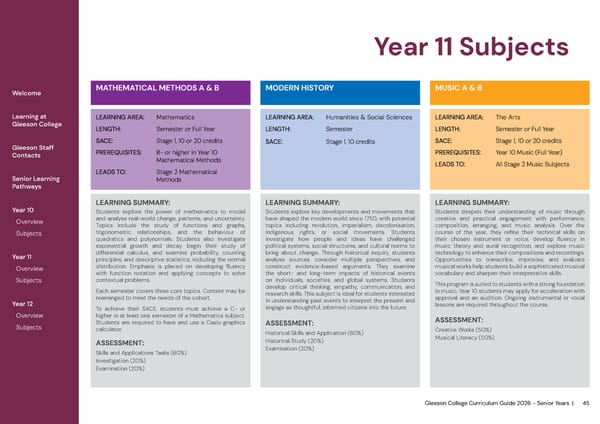Gleeson College Curriculum Guide 2026 - Senior Years | 45 Year 11 Subjects Welcome Learning at Gleeson College Gleeson Staff Contacts Senior Learning Pathways Year 10 Overview Subjects Year 11 Overview Subjects Year 12 Overview Subjects LEARNING SUMMARY: Students explore the power of mathematics to model and analyse real-world change, patterns, and uncertainty. Topics include the study of functions and graphs, trigonometric relationships, and the behaviour of quadratics and polynomials. Students also investigate exponential growth and decay, begin their study of differential calculus, and examine probability, counting principles, and descriptive statistics, including the normal distribution. Emphasis is placed on developing fluency with function notation and applying concepts to solve contextual problems. Each semester covers three core topics. Content may be rearranged to meet the needs of the cohort. To achieve their SACE, students must achieve a C- or higher in at least one semester of a Mathematics subject. Students are required to have and use a Casio graphics calculator. ASSESSMENT: Skills and Applications Tasks (60%) Investigation (20%) Examination (20%) MATHEMATICAL METHODS A & B LEARNING AREA: Mathematics LENGTH: Semester or Full Year SACE: Stage 1, 10 or 20 credits PREREQUISITES: B- or higher in Year 10 Mathematical Methods LEADS TO: Stage 2 Mathematical Methods MODERN HISTORY LEARNING AREA: Humanities & Social Sciences LENGTH: Semester SACE: Stage 1, 10 credits LEARNING SUMMARY: Students explore key developments and movements that have shaped the modern world since 1750, with potential topics including revolution, imperialism, decolonisation, Indigenous rights, or social movements. Students investigate how people and ideas have challenged political systems, social structures, and cultural norms to bring about change. Through historical inquiry, students analyse sources, consider multiple perspectives, and construct evidence-based arguments. They examine the short- and long-term impacts of historical events on individuals, societies, and global systems. Students develop critical thinking, empathy, communication, and research skills. This subject is ideal for students interested in understanding past events to interpret the present and engage as thoughtful, informed citizens into the future. ASSESSMENT: Historical Skills and Application (60%) Historical Study (20%) Examination (20%) MUSIC A & B LEARNING AREA: The Arts LENGTH: Semester or Full Year SACE: Stage 1, 10 or 20 credits PREREQUISITES: Year 10 Music (Full Year) LEADS TO: All Stage 2 Music Subjects LEARNING SUMMARY: Students deepen their understanding of music through creative and practical engagement with performance, composition, arranging, and music analysis. Over the course of the year, they refine their technical skills on their chosen instrument or voice, develop fluency in music theory and aural recognition, and explore music technology to enhance their compositions and recordings. Opportunities to transcribe, improvise, and evaluate musical works help students build a sophisticated musical vocabulary and sharpen their interpretative skills. This program is suited to students with a strong foundation in music. Year 10 students may apply for acceleration with approval and an audition. Ongoing instrumental or vocal lessons are required throughout the course. ASSESSMENT: Creative Works (50%) Musical Literacy (50%)
 2026 Gleeson College Senior Years Curriculum Guide 2026 Page 44 Page 46
2026 Gleeson College Senior Years Curriculum Guide 2026 Page 44 Page 46